Healthcare Contract Management Software: Concord
From physician agreements to vendor contracts, manage every document with HIPAA-compliant security and automated compliance tracking.
Cut audit prep from weeks to hours
Pull any contract’s BAA status, terms, and compliance history instantly
Never miss credentialing deadlines
Automated alerts 90 days before physician licenses, certifications expire
Track spend across all vendors
See total Medtronic spend across facilities without digging through 50+ contracts
“Concord is my one-stop shop for the entire contract lifecycle. It’s Google docs, Microsoft Word, DocuSign and a File explorer, all in one.”

Hannah L., ⭐⭐⭐⭐⭐
Book a demo
What is Healthcare Contract Management Software?
Healthcare contract management software is a specialized technology solution designed to help healthcare organizations centralize, automate, and manage their contracts while ensuring HIPAA compliance and regulatory adherence. Concord addresses the unique challenges of managing diverse healthcare agreements including payer contracts, physician agreements, vendor contracts, and business associate agreements.
Healthcare organizations use software like Concord to:
- Maintain HIPAA compliance with secure document storage
- Automate contract workflows and approval processes
- Track regulatory requirements and deadlines
- Manage business associate agreements (BAAs)
- Integrate with EHR and other healthcare systems
- Reduce compliance risks by up to 55%
- Achieve ROI of 598% within one year
The global healthcare contract management software market is projected to reach $9.68 billion by 2032, growing at 23.3% CAGR, reflecting the critical importance of these solutions for modern healthcare operations.
Healthcare Contract Management Statistics
- $9.68 billion – Market size by 2032
- 23.3% – Annual market growth rate
- 598% – Average ROI in first year
- 80% – Reduction in contract processing time
- 55% – Improvement in compliance rates
- 26 seconds – AI contract review time vs 92 minutes manual
Table of Contents
Real-world impact: Case studies in healthcare contract management software
Case Study: Automated Approval Matrix Transforms Legal Operations at AANA
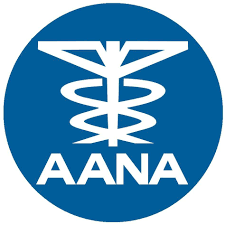
Key Benefits:
- • Centralized repository
- • AI data extraction
- • Matrix automation
The American Association of Nurse Anesthesiology’s rapid growth outpaced its legal operations. Contracts were scattered across departments, and manual approval routing created bottlenecks.
How Concord helped:
- • Concord centralized all contracts in one secure repository
- • Automated workflows enforce approval matrix policy
- • AI extracts key data automatically
“Concord has been a game-changer. It has automated our workflows, minimized the chance for errors, and provided us a clear view of all our contracts.” — Bobby Saleem, Director of Legal Affairs
Case Study: Enterprise CLM Saves Time and Money at Sevita

Key Benefits:
- • Unlimited e-signatures
- • Real-time editing
- • Flexible workflows
With 30,000+ employees, Sevita’s contracts were locally managed without oversight. This led to compliance issues, financial losses from missed renewals, and audit difficulties.
How Concord helped:
- • Concord centralizes thousands of contracts weekly across all teams
- • Built-in e-signatures with no per-user fees
- • Automated deadline tracking prevents costly renewals
“Many hours saved, many dollars saved in contracts that we meant to terminate and forgot. I don’t think we’ve paid out a contract since we’ve implemented Concord because now we can track when the notice is coming up.” — Jennifer Neville, Associate Corporate General Counsel
Essential capabilities of healthcare contract management software
Modern healthcare contract management platforms integrate several core capabilities that address these specific challenges while enabling enhanced operational efficiency:
Centralized secure repository with advanced search
At the foundation of effective healthcare contract management is a secure, centralized repository that serves as the single source of truth for all agreements. This addresses a critical need—centralizing healthcare contracts to improve efficiency and maintain compliance within a secure platform.
Key repository features include:
- Comprehensive metadata tagging for efficient organization
- Full-text search with optical character recognition (OCR) for scanned documents
- HIPAA-compliant security with encryption and access controls
- Version control with complete audit trails
- Document labeling for systematic organization
Healthcare-specific compliance features
Unlike general contract management solutions, healthcare-focused platforms incorporate specific capabilities to address industry regulations:
- HIPAA compliance safeguards for protected health information (PHI)
- Built-in regulatory compliance checks
- Business associate agreement (BAA) templates and tracking
- Integrated credentialing management
- Medicare and Medicaid requirements monitoring
Due to the sensitive nature of the information healthcare organizations deal with, your contract management software should be designed with compliance and security as a top priority.
Automated workflow management
Healthcare contract management software significantly streamlines the creation and processing of agreements through:
- Customizable approval workflows based on contract type and value
- Role-based security for appropriate access and permissions
- Status tracking throughout the contract lifecycle
- Automated routing to appropriate stakeholders
- Integration with e-signature solutions for digital execution
AI-powered analysis and intelligence
Artificial intelligence represents a transformative capability in modern healthcare contract management software, enabling:
- Automated data extraction from legacy agreements
- Risk identification across the contract portfolio
- Obligation tracking and automatic alerts
- Anomaly detection in non-standard terms
- Pattern recognition for improved negotiations
AI can complete contract reviews in approximately 26 seconds compared to 92 minutes for human reviewers, while achieving 10% higher accuracy—a dramatic efficiency improvement that frees healthcare professionals to focus on higher-value activities.
Integration with healthcare systems
Healthcare contract management software provides significant value through integration with other healthcare operational systems:
- Electronic Health Record (EHR) systems
- Revenue cycle management platforms
- Credentialing systems
- Financial and accounting software
- Supply chain management solutions
These integrations create a unified data environment that enhances visibility and enables more informed decision-making across the organization.
The business impact of healthcare contract management software
Organizations implementing robust healthcare contract management solutions report significant operational, financial, and strategic benefits:
Operational efficiency gains
Healthcare contract management software delivers substantial time and resource savings as illustrated in the following table:
| Process Area | Traditional Approach | With Healthcare Contract Management Software | Impact |
|---|---|---|---|
| Contract Creation | Manual drafting from scratch | Template-based automated generation | 70-80% time reduction |
| Contract Review | Manual review requiring multiple hours | AI-assisted review highlighting exceptions | 80-90% faster review cycles |
| Approval Workflows | Email-based approvals with manual tracking | Automated routing with status visibility | 60-70% reduction in approval time |
| Contract Storage | Paper files or network folder storage | Centralized, searchable repository | 6x faster document retrieval |
| Renewal Management | Calendar-based manual tracking | Automated alerts and proactive notifications | 80%+ reduction in missed renewals |
| Compliance Verification | Manual checklist verification | Automated compliance scanning and validation | 55% improvement in compliance rates |
These efficiency gains translate directly to operational capacity, allowing healthcare staff to focus on patient care and strategic initiatives rather than administrative contract management tasks.
Enhanced compliance and risk mitigation
Healthcare contract management software significantly strengthens organizational risk posture:
- Improved contract compliance through digitization and automated monitoring
- Reduced contract-related legal disputes through standardized language
- Enhanced data security and HIPAA compliance
- Better visibility into non-standard terms and potential liabilities
- Comprehensive audit trails for regulatory requirements
According to a Deloitte survey, companies using AI-driven risk mitigation strategies experienced a 45% reduction in contract disputes, demonstrating the tangible risk-reduction benefits of advanced contract management capabilities.
Financial optimization
Beyond operational efficiencies, healthcare contract management software delivers substantial financial benefits:
- Revenue optimization through better payer contract management
- Cost reduction through improved vendor negotiations
- Avoidance of auto-renewals for unfavorable agreements
- Reduced administrative overhead costs
- Lower compliance-related penalties and legal expenses
Healthcare organizations can achieve ROI payback in less than three months with the right solution implementation, demonstrating the significant financial impact these systems can deliver.
Implementation considerations for healthcare organizations
While the benefits of healthcare contract management software are compelling, successful implementation requires careful planning and execution. Healthcare organizations should consider several key factors:
Organizational readiness assessment
Before selecting a healthcare contract management solution, organizations should assess:
- Current contract volume and complexity across departments
- Existing contract storage locations and formats
- Stakeholder needs from legal, finance, and clinical departments
- Available IT resources for implementation
- Data security and compliance requirements
This assessment establishes critical baselines for both solution selection and subsequent ROI evaluation.
Healthcare-specific feature prioritization
Not all contract management capabilities deliver equal value to every healthcare organization. Implementation teams should prioritize features based on:
- Specific organizational pain points in current processes
- Volume and types of contracts managed
- Regulatory compliance requirements for the organization’s specific services
- Integration needs with existing clinical and administrative systems
- Budget constraints and phasing opportunities
Implementation timeline and approach
Implementation timelines vary significantly based on solution complexity, data migration requirements, and organizational factors. While some implementations can be completed in under a month, 72% of legal teams report implementations taking at least two months, with 20% extending beyond six months.
A phased implementation approach often delivers the best results for healthcare organizations:
- Phase 1 (0-3 months): Conduct contract inventory audit, standardize naming conventions, establish baseline metrics
- Phase 2 (3-6 months): Repository setup, data migration, user training, automated alerts
- Phase 3 (6-12 months): Advanced features, integration with clinical systems, reporting refinement
Change management and adoption planning
The success of healthcare contract management software depends heavily on effective adoption across multiple departments. Organizations should develop comprehensive change management plans that include:
- Executive sponsorship from clinical and administrative leadership
- Targeted training programs for different user groups
- Early engagement of key stakeholders from legal, finance, and clinical areas
- Clear communication of benefits and expectations
- Celebration of early wins and success stories
AI and the future of healthcare contract management
Artificial intelligence represents the cutting edge of healthcare contract management innovation. Modern AI capabilities are transforming how healthcare organizations approach contracts in several important ways:
Generative AI for contract creation
Generative AI systems can create initial contract drafts based on specified parameters, drawing from existing templates and clause libraries while incorporating organization-specific requirements. These AI-generated drafts dramatically accelerate the starting point for healthcare legal teams, though human review remains essential for final validation.
Enhanced contract review and analysis
AI significantly accelerates contract review by automatically analyzing agreements against organizational policies and regulatory requirements. These tools can identify non-standard terms, suggest alternatives, and provide plain-language summaries of complex provisions. For healthcare organizations dealing with complex payer contracts, this capability is particularly valuable for optimizing reimbursement terms.
Intelligent obligation management
AI-powered systems can automatically extract and track obligations from contracts, ensuring that critical requirements are identified and monitored throughout the contract lifecycle. This capability is especially important for healthcare organizations managing complex regulatory requirements across numerous agreements.
Proactive risk identification
Advanced AI systems can identify potential risks in contracts before they manifest as problems, allowing healthcare organizations to address issues proactively. By analyzing historical agreement performance and industry benchmarks, these systems provide valuable insights for risk mitigation.
HIPAA compliance considerations for healthcare contract management
For healthcare organizations, HIPAA compliance represents a critical requirement for any contract management solution. Key considerations include:
Protected health information (PHI) safeguards
Healthcare contract management systems must incorporate robust security measures to protect PHI that may be referenced in contracts or associated documents:
- Data encryption both in transit and at rest
- Role-based access controls limiting PHI visibility
- Complete audit trails of all system activities
- Secure data storage and backup protocols
- Business associate agreement provisions
Business associate agreement management
HIPAA requires healthcare organizations to establish business associate agreements (BAAs) with any vendor that may encounter protected health information. Healthcare contract management software should provide:
- BAA templates compliant with current regulations
- Automated BAA tracking and management
- Renewal notifications for expiring BAAs
- Integration with vendor management systems
- Compliance verification capabilities
Vendor risk assessment
Healthcare organizations must assess the security practices of their vendors to ensure HIPAA compliance. Contract management platforms should support:
- Vendor security questionnaire distribution and tracking
- Risk scoring for vendor security practices
- Documentation of security certifications
- Monitoring of vendor compliance status
- Integration with third-party risk management systems
How Concord Compares to Other Healthcare Contract Management Solutions
| Feature | Concord | DocuSign CLM | Conga | Icertis |
|---|---|---|---|---|
| HIPAA Compliance | ✓ Full compliance | ✓ Full compliance | ✓ Full compliance | ✓ Full compliance |
| AI-Powered Term Extraction | ✓ Advanced | ✓ Basic | ✓ Advanced | ✓ Advanced |
| Healthcare-Specific Templates | ✓ 50+ templates | ✓ 20+ templates | ○ Limited | ✓ 30+ templates |
| Implementation Time | 2-4 weeks | 8-12 weeks | 6-10 weeks | 10-14 weeks |
| EHR/EMR Integration | ✓ Seamless | ○ Limited | ✓ Most systems | ○ Limited |
| Contract Analytics | ✓ Real-time | ✓ Limited | ✓ Advanced | ✓ Advanced |
| Mobile Accessibility | ✓ Full functionality | ✓ Limited | ✓ Limited | ✓ Full functionality |
| Customer Support | 24/7 dedicated | Business hours | Business hours | Business hours |
Frequently Asked Questions
What types of healthcare contracts can healthcare contract management software handle?
Healthcare contract management software manages all types of healthcare agreements including payer contracts with complex reimbursement schedules, physician employment agreements, vendor and supplier contracts, business associate agreements (BAAs), equipment maintenance contracts, clinical trial agreements, technology licensing deals, and real estate leases. The software provides specialized templates and compliance features for each contract type.
How does healthcare contract management software protect patient data under HIPAA?
Healthcare contract management software ensures HIPAA compliance through enterprise-grade security measures including data encryption in transit and at rest, role-based access controls limiting PHI visibility, comprehensive audit trails documenting all activities, SOC 2 Type II certification, and automated business associate agreement (BAA) management. These features protect sensitive patient information while enabling efficient contract processes.
Can healthcare contract management software integrate with Electronic Health Records (EHR) systems?
Yes, modern healthcare contract management software offers robust integration capabilities with EHR systems, revenue cycle management platforms, credentialing systems, financial software, and supply chain management solutions. These integrations create a unified data environment that enhances visibility across healthcare operations and enables informed decision-making.
What compliance features are essential in healthcare contract management software?
Essential compliance features include HIPAA compliance safeguards, built-in regulatory compliance checks, business associate agreement templates and tracking, automated credentialing management, Medicare and Medicaid requirements monitoring, comprehensive audit trails, and real-time compliance dashboards. These features help healthcare organizations maintain regulatory compliance and avoid costly violations.
How much can healthcare organizations save with contract management software?
Healthcare organizations typically achieve 60-80% reduction in administrative time, 2-5% cost savings on contract values, and ROI payback within 3-18 months. A mid-sized healthcare system can generate several million dollars in annual benefits through improved efficiency, better contract terms, reduced compliance penalties, and enhanced revenue capture from payer contracts.
What AI capabilities does healthcare contract management software provide?
Healthcare contract management software leverages AI for automated extraction of payment schedules, HIPAA compliance clauses, provider credentialing details, and regulatory terms. AI also provides risk identification across contract portfolios, obligation tracking with automatic alerts, anomaly detection in non-standard terms, and pattern recognition for improved negotiations, completing contract reviews in seconds versus hours.
How does healthcare contract management software improve payer contract management?
Healthcare contract management software optimizes payer contracts through automated extraction of reimbursement schedules and payment terms, proactive alerts for renegotiation opportunities, historical performance analysis for better negotiations, compliance monitoring for value-based care requirements, and integration with revenue cycle systems to maximize reimbursement capture and reduce revenue leakage.
What implementation timeline should healthcare organizations expect for contract management software?
Healthcare contract management software implementation typically follows a phased approach: Phase 1 (0-3 months) includes contract inventory and standardization, Phase 2 (3-6 months) covers repository setup and user training, and Phase 3 (6-12 months) involves advanced features and system integrations. While some implementations complete in under a month, 72% of healthcare organizations require at least two months for full deployment.
Conclusion: From administrative burden to strategic asset
Healthcare contract management software has evolved from basic document storage to sophisticated operational platforms that transform how healthcare organizations function. By centralizing, automating, and enhancing contract processes, these solutions deliver substantial operational efficiencies while providing strategic insights previously buried in static agreements.
Organizations implementing these platforms report significant improvements in efficiency, compliance, and decision-making capabilities. The robust market growth projections—reaching nearly $10 billion by 2032 Data Bridge Market Research—reflect the increasing recognition of these benefits across the healthcare industry.
As artificial intelligence and integration capabilities continue to advance, healthcare contract management software will increasingly serve as strategic nerve centers connecting contractual relationships to broader organizational objectives. This evolution transforms contracts from administrative necessities into valuable strategic assets that enhance healthcare operations, improve patient care, and strengthen financial performance.
For healthcare organizations evaluating contract management solutions, the key consideration is not whether such systems deliver value, but rather how to implement them most effectively to address specific organizational needs and capture maximum benefit from their contract ecosystem.
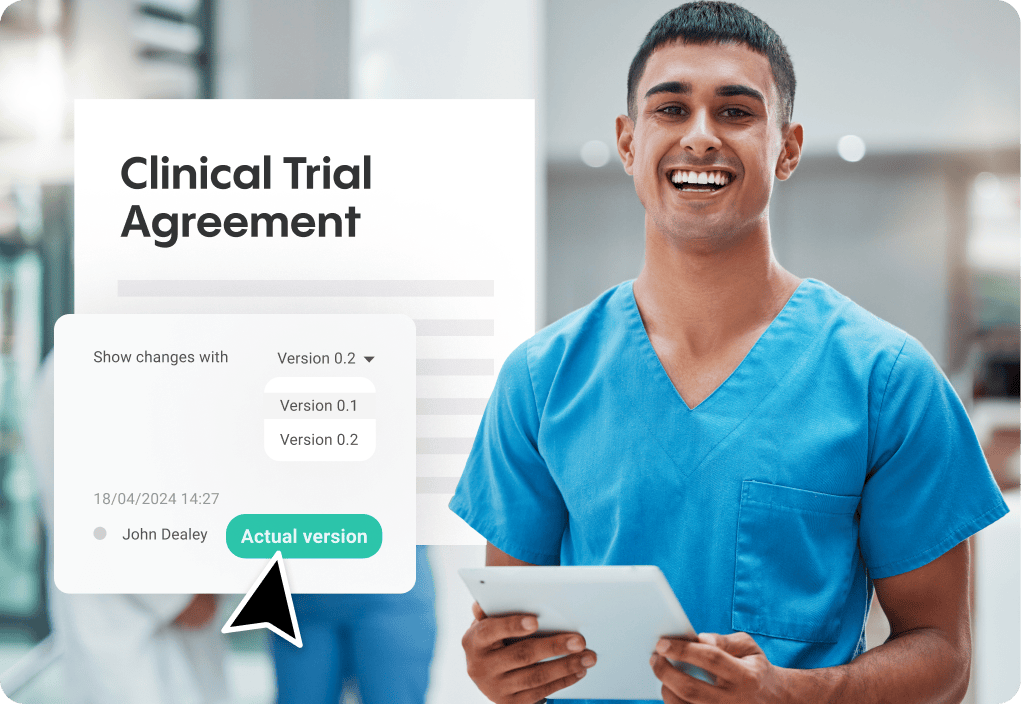
THE CHALLENGE
Managing healthcare contracts is more complex than ever
Healthcare organizations face unique challenges in contract management, with increasing regulatory requirements and data privacy concerns. Key pain points include:
- Maintaining HIPAA compliance
- Managing diverse contract types
- Protecting sensitive patient data
- Risk of costly regulatory violations
THE SOLUTION
One purpose-built platform for healthcare compliance
Concord provides a HIPAA-compliant platform that streamlines healthcare contract management while maintaining the highest security standards. Key benefits:
- Secure, centralized repository
- Built-in audit trails for compliance
- Role-based access controls
- Real-time visibility across departments
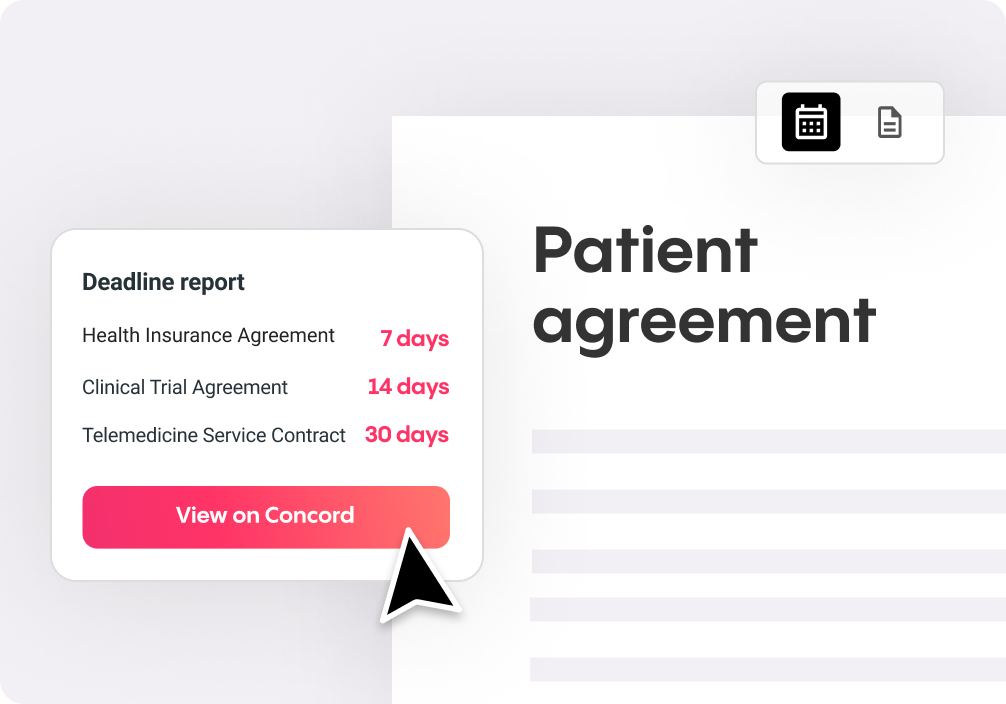
THE RESULTS
Time and labor savings
-20%
less time spent searching for contract terms every day
-40%
less time negotiating sales contracts
-50%
time spent tracking down agreements
Automated processes
Contracts are managed via automated workflows, all in one intuitive platform
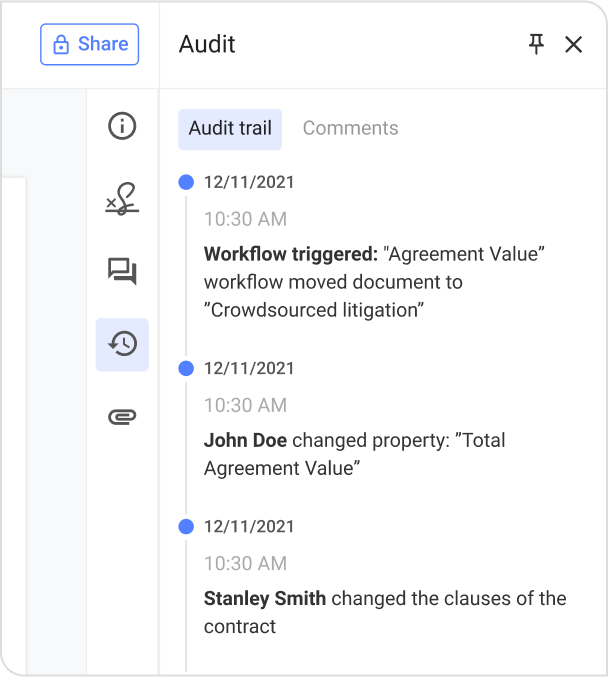
Manual processes
Contracts have to be managed manually, across many platforms

Full visibility into contracts
Your team can quickly search all contracts and get email updates
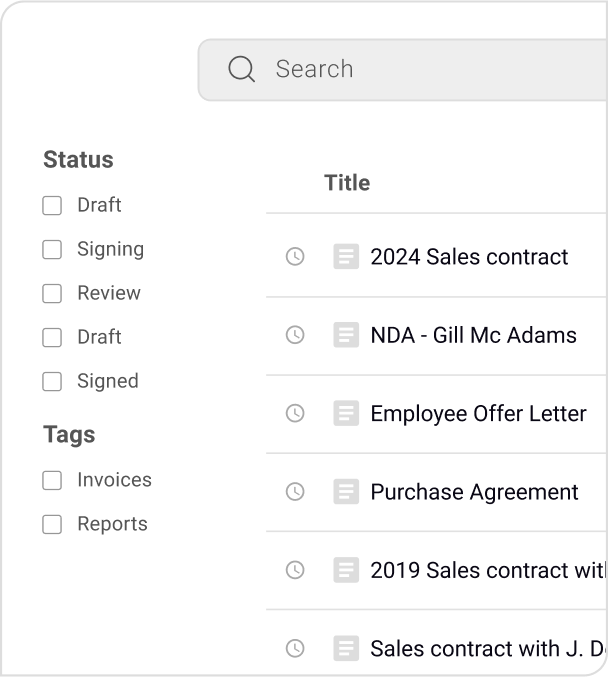
Limited visibility into contracts
The finance team lacks insight into contract amounts and other key terms

AI-powered data extraction
Agreement Intelligence extracts all contract terms automatically
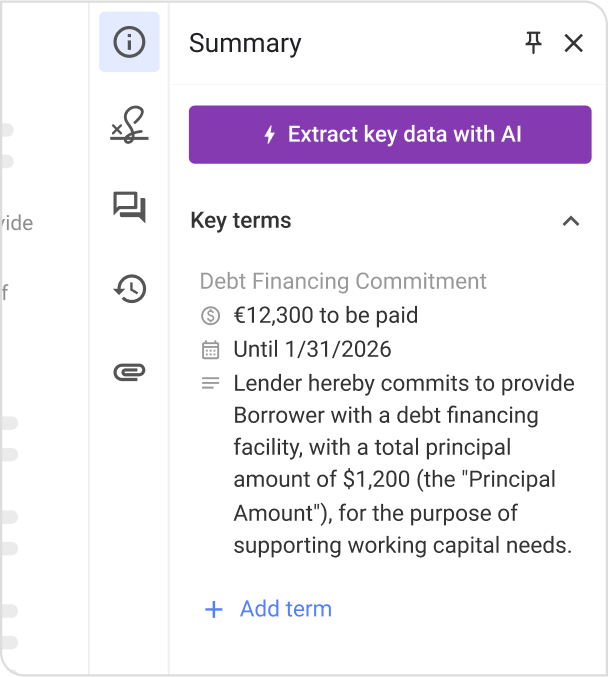
Time-consuming data collection
Forecast data has to be entered by hand, requiring hours of labor

HOW IT WORKS
Extract healthcare terms automatically
Never miss important compliance requirements or regulatory terms. Concord’s AI analyzes contracts to automatically identify and extract:
- Payment schedules and terms
- HIPAA compliance clauses
- Patient data handling requirements
- Insurance and liability terms
- Provider credentialing details
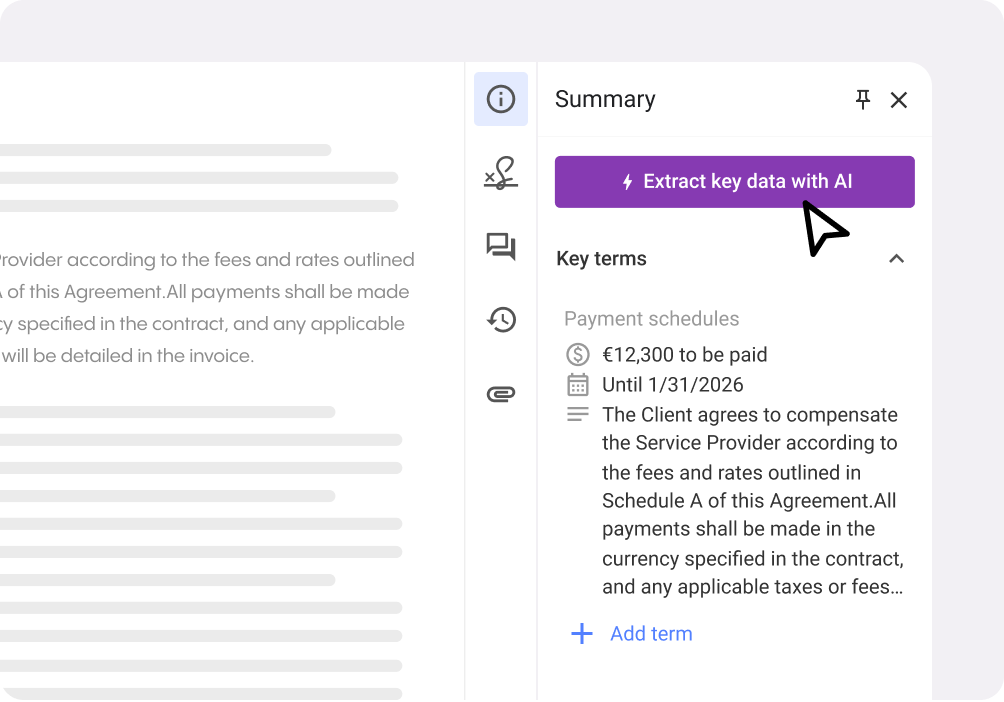
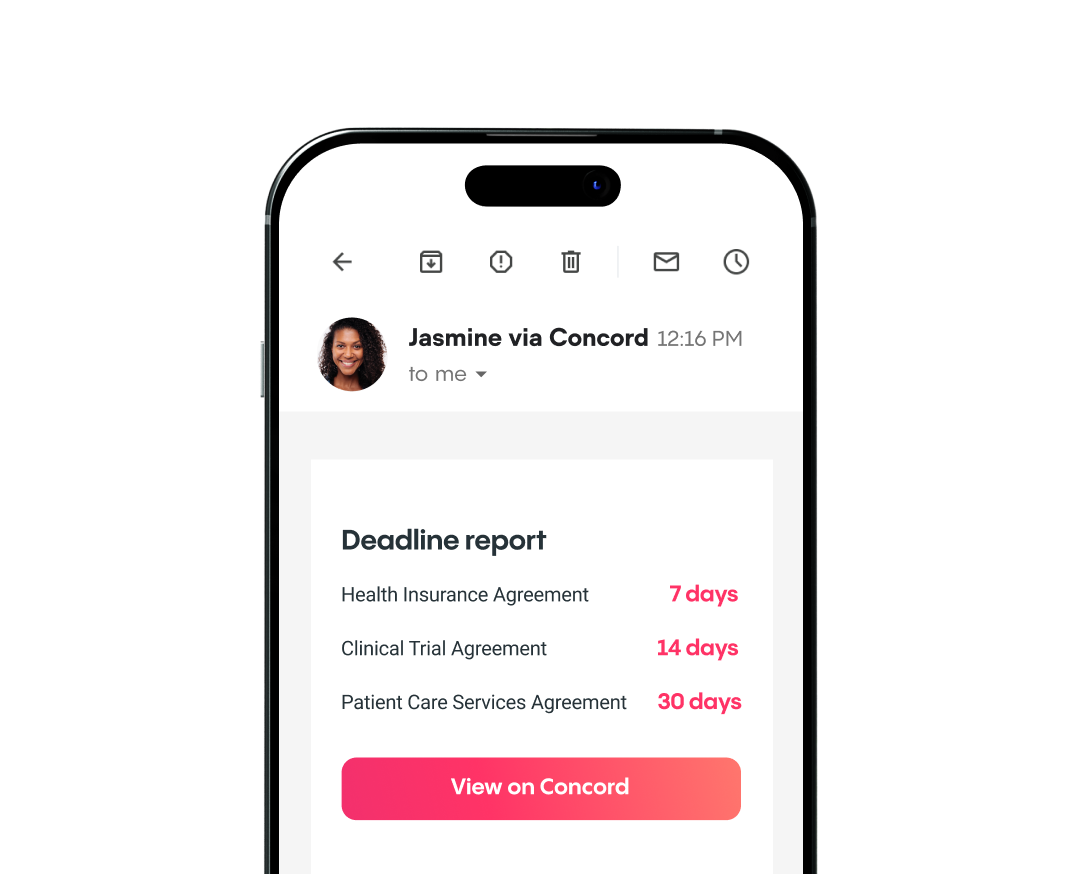
Stay ahead of deadlines
Get automatic alerts for key healthcare compliance dates and deadlines:
- Accreditation requirements
- Provider license renewals
- Insurance policy updates
- Regulatory certification deadlines
- Contract renewal periods
Monitor compliance with real-time dashboards
Generate comprehensive reports to maintain oversight and demonstrate compliance:
- Custom compliance reports
- Contract status across departments
- Provider credentialing metrics
- Regulatory compliance tracking
- Vendor agreement monitoring
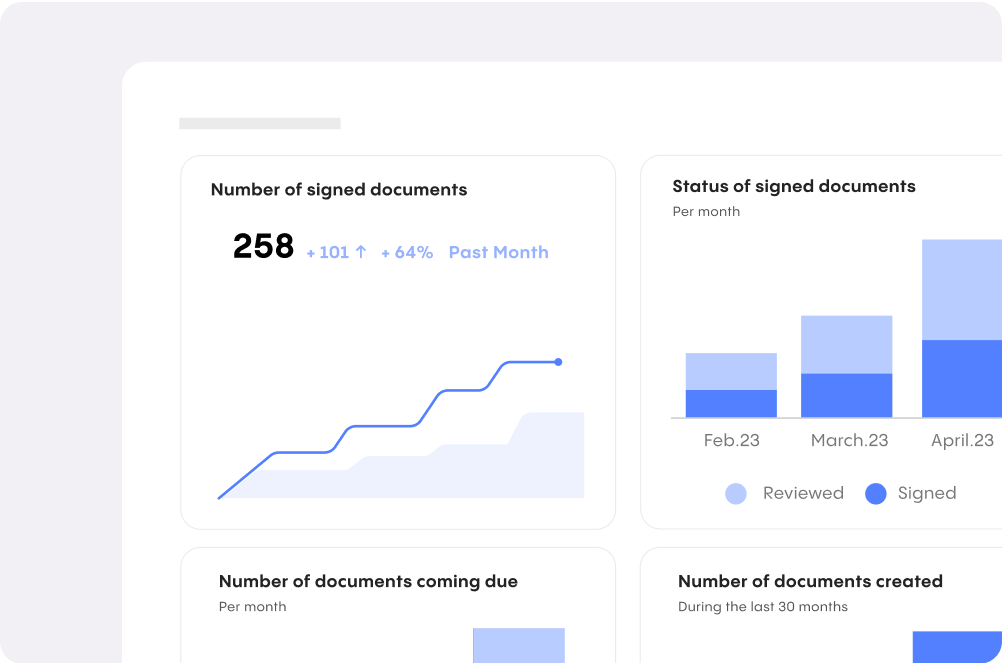
Start sending and signing today.
Concord unlocks the data trapped in your agreements, and transforms it into actionable insights that drive revenue growth.
Intuitive Google-style interface
Industry-leading AI-powered search
Real-time sending and e-signing
Instant access to actionable insights
Unlimited storage for all agreements
Transparent cost-efficient pricing
